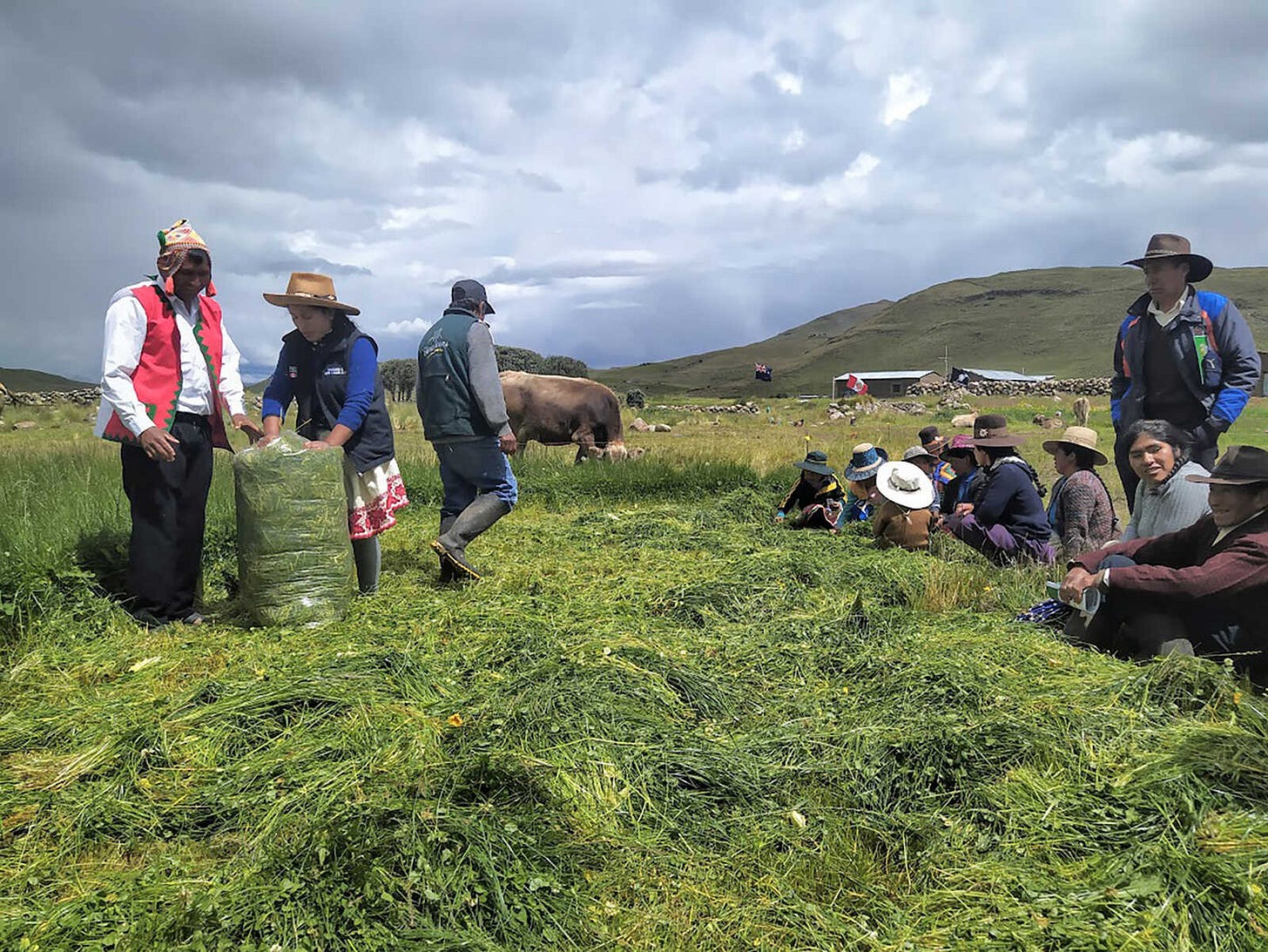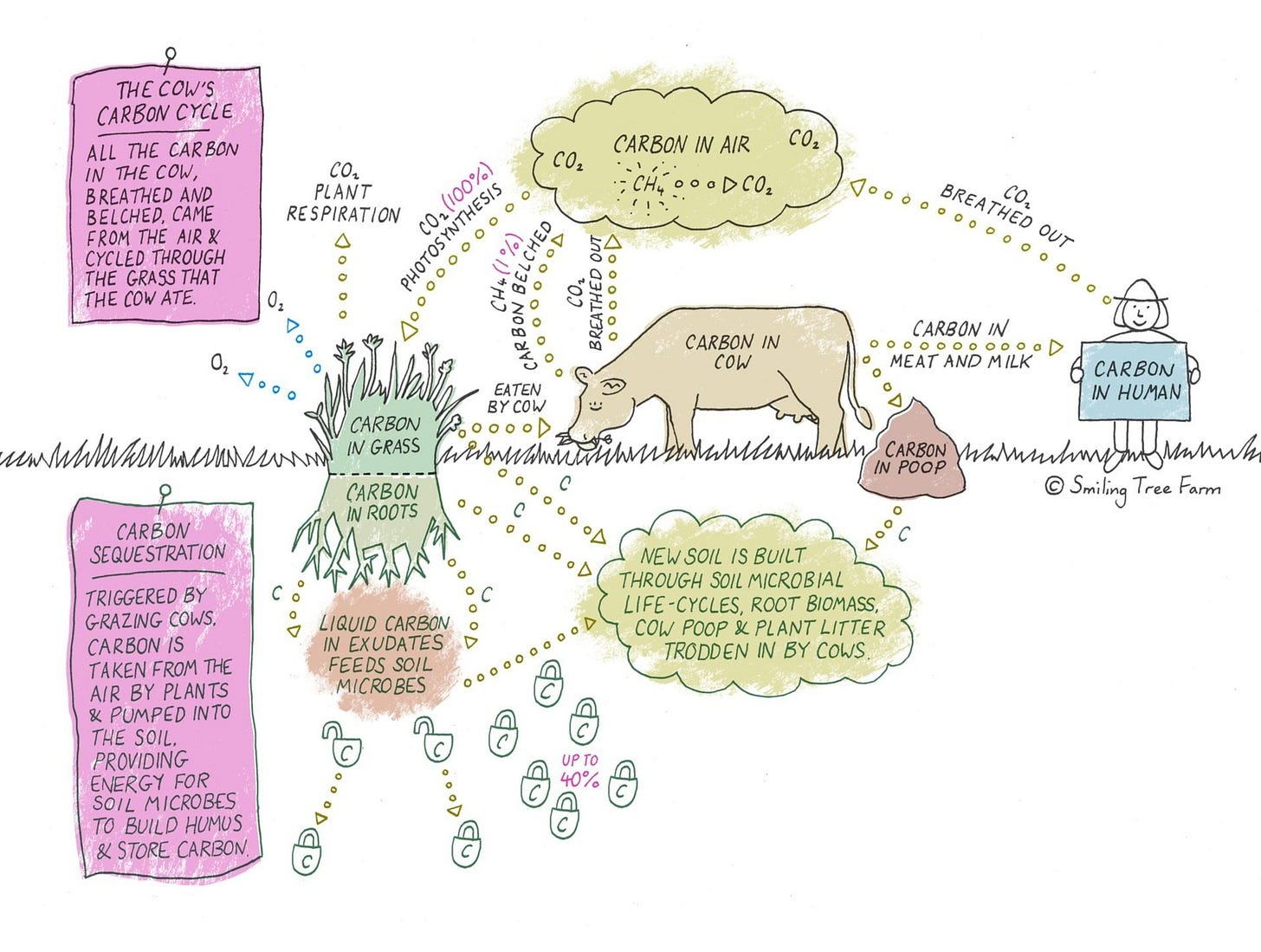Ayni and the Biogenic Methane Cycle
If we view cattle through the lens of reciprocity, would we continue to blame them as the leading cause of climate change?
“Today for you, tomorrow for me,” is the meaning behind the Quechuan word ayni, an Andean life philosophy that emphasizes reciprocity to strike a harmonious balance between nature and mankind.
Ayni, this equilibrium of exchange and mutuality, has been a guiding principle for the Quechua and Aymara people since ancient times. It’s created a cycle of connectivity and support within their social, spiritual, and environmental well-being.
Anthropologist, Catherine Allen, describes it eloquently: “At the most abstract level, ayni is the basic give-and-take that governs the universal circulation of vitality. It can be positive…or…negative…This circulation is driven by a system of continuous reciprocal interchanges, a dialectical pumping mechanism. Every category of being, at every level, participates.”
Reflecting on this word in the context of cattle and the biogenic methane cycle paints a more holistic picture of these ruminants in our food system.
As depicted below and described in this issue of the Regeneration, methane produced biogenically (the kind cows produce) is a part of the earth’s natural system and is destroyed at the same rate of emission.
Grasses feed the cows, whose chomping stimulates new grass growth and whose hoof tracks in the land create indentations for rain to collect. Their manure inoculates the soil with good bacteria, which feed on the carbon from the plants in exchange for essential nutrients. The plants grow stronger and store more carbon, the cows eat more grass, and humans, who are unable to digest grass, eat the cows.
It’s a cycle of ayni.
Compare that to lab- or techno-meat solutions, which rely heavily on extractive farming practices that leave the land depleted and release a ton of carbon, a stock gas that accumulates and stays in the atmosphere.
They have no connection to the whole and to the dismay of many proponents of these products, they have a cost.
One system is built upon a give-and-take balance of connectedness, trusting that harmony is and always will be present.
The other extracts and breaks the cycle of generativity and mutually beneficial exchange.
One is holistic; the other is reductionistic.
As we think about the future of ourselves, our planet, and our food system, in which solutions should we invest? Those with or without a sense of ayni?
Additional Reading:
Ayni, Regenerative Food Forest in the Amazon
Basic Andean Structure and Land Use
Greenhouse gas emissions: What is the difference between stock and flow gases?
Podcast I’m binging:
The ReGen Brands Podcast with Kyle Krull & Anthony Corsaro is a place for consumers, operators, and investors to learn about consumer brands supporting regenerative agriculture and how they’re changing the world. Be sure to check out all of their episodes, but I’d recommend starting with this one with Jamie Ager of Hickory Nut Gap or this one with Paul Grieve of Pasturebird. They’re also here on YouTube.
Book I’m starting:
Voltaire's Bastards: The Dictatorship of Reason in the West by John Ralston Saul
This book was recommended to me by Karl Thidemann of Soil4Climate, who received the recommendation from Alan Savory himself of the Savory Institute. The description alone was enough for me to elevate this book to the top of my reading list: “The Washington Post: "Voltaire's Bastards is a hand grenade disguised as a book. The pages explode with insight, style, and intellectual rigor... [This book] will leave you challenged, intrigued, and at times troubled." A phosphorescently intelligent search-and-destroy mission against the foundations of contemporary civilization. The result is a learned and devastating critique of our political, economic, and cultural establishments.” And if you’re looking for other thought-provoking books, check out this post, Lesser known books that will change the way you think about our food system.
Product I’m enjoying:
The Carnivore Bar is an all-beef bar designed to be a nutrient-dense meal replacement (or snack for my fellow athletes and ectomorphs). With 400 calories in every bar, this is the perfect option for an on-the-go meal for a busy or active person. Specifically designed to be travel-friendly, healthy, and keto-friendly, The Carnivore Bar does not require refrigeration, so it’s ideal for hiking, camping, road trips, or any kind of travel. Their grass-finished beef is sourced from Joyce Farms, a leader in regenerative agriculture, so not only is this a satisfying bar, but it also supports environmental restoration. Check them out here.
Disclaimer: The Regeneration Weekly receives no compensation or kickbacks for brand features - we are simply showcasing great new regenerative products.
If you have any products you would like to see featured, please respond to this newsletter or send an email to meg(at)soil.works
The Regeneration is brought to you by Wholesome Meats | Soilworks | Grassroots Carbon| Grazing Lands



